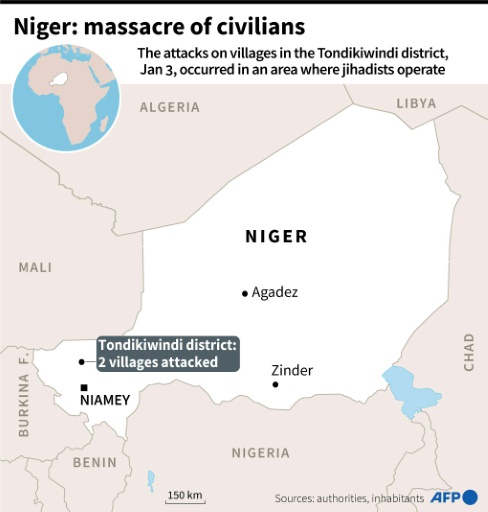
[ad_1]
Niger declared three days of mourning on Monday and pledged to strengthen security in a western border region where jihadists have killed 100 villagers, according to a local report.
“We have decreed three days of national mourning, and on security, we will strengthen the presence” in the border region with Mali, Interior Minister Alkache Alhada told AFP, adding that the government would also launch “forums” to defuse ethnic tensions. .
Dozens of “terrorists”, arrived by motorbike, killed 70 people in the village of Tchoma Bangou and 30 in Zaroumadareye, local mayor Almou Hassane told AFP on Sunday.
It was the largest massacre of civilians in the eight-year history of Islamist unrest in the Sahel, according to an American group, ACLED, which tracks the violence.
Alhada, speaking by telephone after a meeting of the National Security Council chaired by President Mahamadou Issoufou, said the number of troops would be increased to achieve “greater saturation” of the area.
“We have to stop the incursions. We have to create a kind of security cordon, but one of the difficulties is that there is a vacuum on the Malian side,” he said.
Alhada also pledged support, in the form of food aid, to communities that had suffered losses.
Plans to strengthen the army
Niger is caught in a pinch between jihadists crossing from Mali, in its south-west, and Nigeria, in its south-east.
Thirty-four people were killed in the southeastern region of Diffa on December 12 by jihadists from Boko Haram.
Its ill-equipped and poorly trained armed forces have lost nearly 200 men to road bombs and raids in camps over the past two years.
The government has already unveiled plans to double military personnel to “at least 50,000” over the next five years. Defense already represents 17% of the budget.
The jihadist insurgency in the vast Sahel began in northern Mali eight years ago, then spread to Niger and Burkina Faso.
Thousands of people in these countries have died and nearly three million people have fled their homes, according to UN figures.
Jihadist violence has also fueled ethnic tensions.
Alhada said the government would organize forums with ethnic and religious leaders to “prevent the risk of intra-ethnic conflict” in the border area.
“In this region which is a chain of multi-ethnic villages, these incursions can lead to intra-community conflicts. We have to let people know,” he said.
“I was there yesterday with the prime minister. It’s difficult – we saw the graves, the relatives of the victims. We have to hold back (the anger) to prevent outbreaks. Some people are asking for weapons,” Alhada said.
Source link